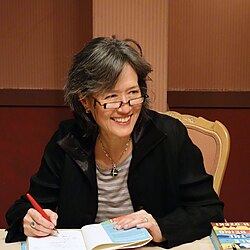Ruth Ozeki Quote
She told me it’s called the Maka Hanya Haramita Shingyo,69 which means something like the Great Most Excellent Wisdom Heart Sutra. The only part I remember goes like this: Shiki fu i ku, ku fu i shiki.70 It’s pretty abstract. Old Jiko tried to explain it to me, and I don’t know if I understood it correctly or not, but I think it means that nothing in the world is solid or real, because nothing is permanent, and all things—including trees and animals and pebbles and mountains and rivers and even me and you—are just kind of flowing through for the time being.
Ruth Ozeki
She told me it’s called the Maka Hanya Haramita Shingyo,69 which means something like the Great Most Excellent Wisdom Heart Sutra. The only part I remember goes like this: Shiki fu i ku, ku fu i shiki.70 It’s pretty abstract. Old Jiko tried to explain it to me, and I don’t know if I understood it correctly or not, but I think it means that nothing in the world is solid or real, because nothing is permanent, and all things—including trees and animals and pebbles and mountains and rivers and even me and you—are just kind of flowing through for the time being.
Related Quotes
People lack morals, good moral character is important in every aspect of your life. Honesty and Integrity opens the door. Your character allows others to see you for who you truly are. Make your first...
Amaka Imani Nkosazana
Tags:
abundance, adventure, aspects, believe, character, complete, completeness, difference, differences, friendship
About Ruth Ozeki
Ruth Ozeki (born March 12, 1956) is an American-Canadian author, filmmaker and Zen Buddhist priest. Her books and films, including the novels My Year of Meats (1998), All Over Creation (2003), A Tale for the Time Being (2013), and The Book of Form and Emptiness (2021), seek to integrate personal narrative and social issues, and deal with themes relating to science, technology, environmental politics, race, religion, war and global popular culture. Her novels have been translated into more than thirty languages. She teaches creative writing at Smith College, where she is the Grace Jarcho Ross 1933 Professor of Humanities in the Department of English Language and Literature.
